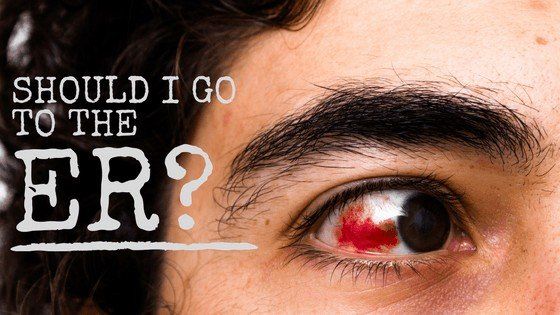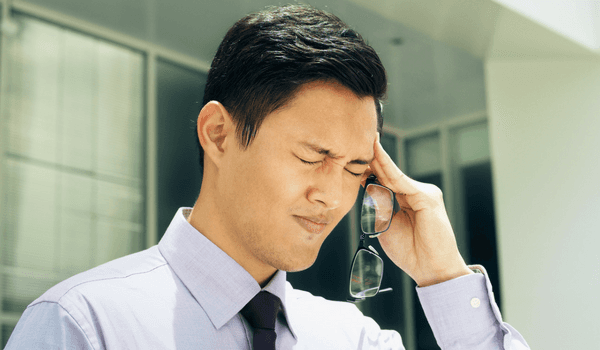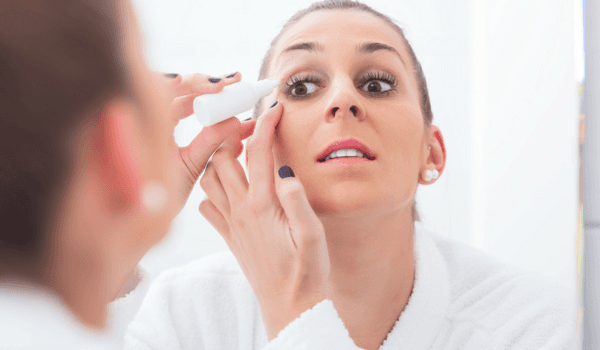Should I Go To The Emergency Room If My Eye Hurts?
So it’s the weekend and the mild discomfort you were experiencing midweek has now escalated into full blown intense pain. Or maybe you were working on the yard and something flew into your eye?
Or perhaps you were wearing your contact lenses for too long and your eye is now extremely red and unhappy. Who do you call? (I’ll give you a hint, it’s not Ghostbusters.) But seriously, should you go to the ER if you injure your eye in some way? The answer might surprise you.
Do These Symptoms Sound Familiar?
Let’s start with some reasons you might find yourself wondering if you should seek medical care. Here are a few common symptoms that warrant a call or visit to your optometrist:
- Eye pain
- Redness
- Irritation from contact lens wear
- Discharge
- Eye injuries
- Foreign objects in the eye
- Exposure to chemicals and/or other eye irritants
- Welder’s burn
- Puffiness or swelling
- Styes
To Go Or Not To Go?
In most cases, if your pain or injury involves your eye(s) it is always better to see an eye care professional instead of making a trip to the ER. This is true for several reasons. Here’s a few:
- Not all emergency room or urgent care facilities have the equipment needed to properly examine the eyes.
- While general practitioners and urgent care physicians have a wealth of knowledge in many different areas of care, Optometrists and Ophthalmologists specialize in vision and eye conditions.
- A misdiagnosis could cost you your sight.
- A good majority of the time, you will be referred to an eye doctor anyways, so seeing an eye care professional first will save you time and money.
What To Do Instead
Your first course of action in the event of trauma to the eye or any prolonged discomfort should always be making a call to your optometrist’s office. They will be able to let you know if your symptoms require immediate attention and if there are any special instructions you need to follow such as flushing the eye or removing contact lenses.
Under no circumstances, however, should you ever try to treat yourself without specific direction from an eyecare professional. This includes but is not limited to - rubbing your eyes, applying pressure, using prescription or non-prescription drops, and trying to remove objects from the eye yourself.
If you are a BeSpoke Vision patient and have an eye emergency during office hours, please call us at 405-341-2062. After office hours, please visit our Eye Exam page to locate emergency eye exam contact information. If your situation is not urgent, you are welcome to schedule an appointment online.
When A Trip To The ER Is Unavoidable
What if it’s outside of normal business hours? A lot of eyecare offices will have an after hours emergency number listed on their answering machine message that will connect you directly to an eyecare professional.
If this is not the case, and you are unable to reach someone, unfortunately going to the emergency room or urgent care might be your best option for prompt treatment. It is always better to err on the side of caution when it comes to your sight, and emergency room care is better than no care at all.
Other scenarios that would warrant an immediate trip to the ER are:
- Injuries involving other parts of the body in addition to the eyes
- Impalement of the eye
- Head trauma with suspected concussion or other neurological damage
- Bleeding from the eye(s)
Protect Those Peepers!
The best way to avoid an unnecessary injury or eye infection is to practice good eye health and safety measures. This includes wearing protective eyewear when in hazardous working conditions, staying on top of your yearly eye exams, protecting your eyes from harmful UV rays with sunglasses, utilizing blue light protective lenses when working on computers or handheld devices, and practicing good hygiene when wearing contact lenses.






